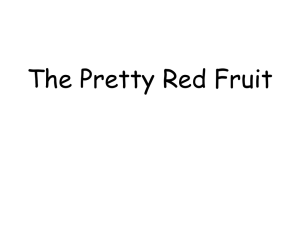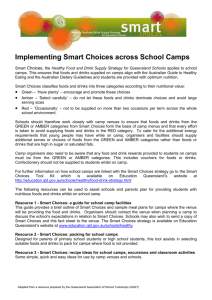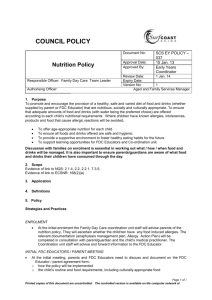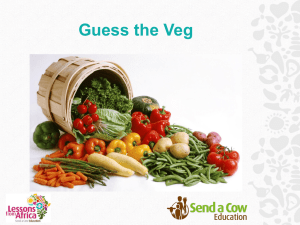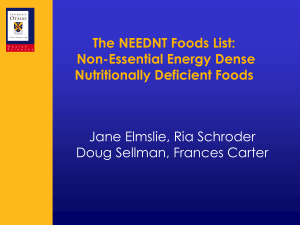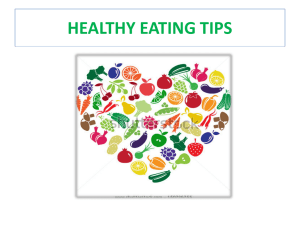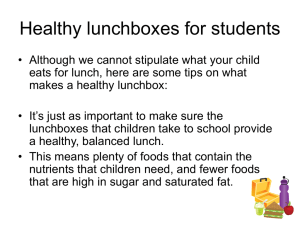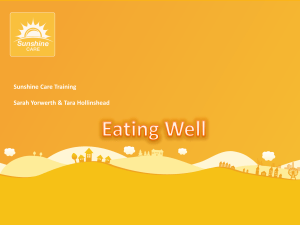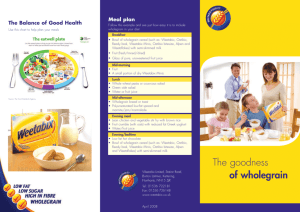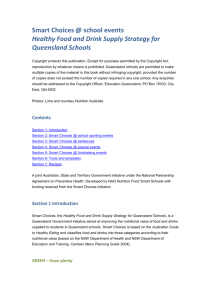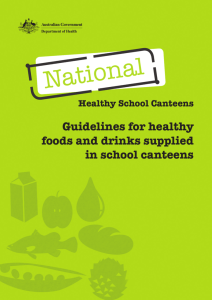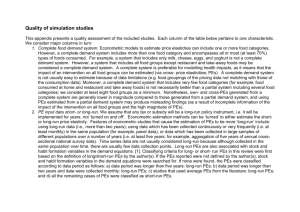A healthy start to school
advertisement
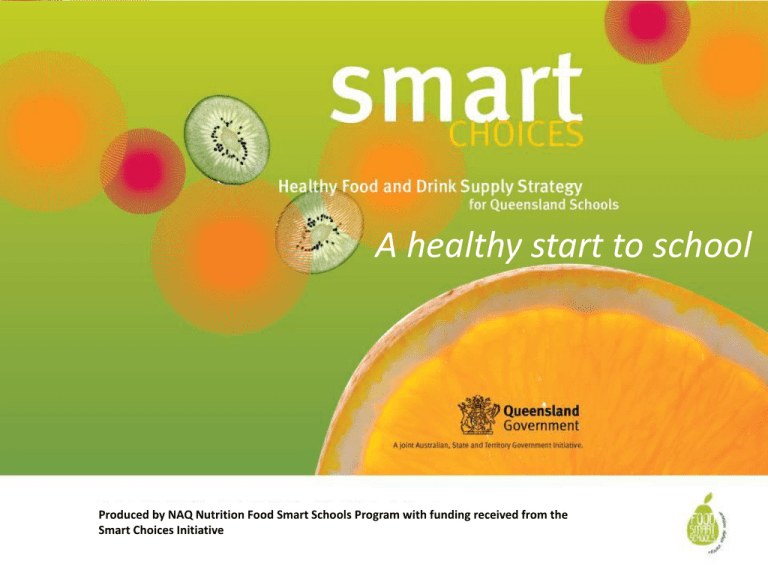
A healthy start to school Produced by NAQ Nutrition Food Smart Schools Program with funding received from the Smart Choices Initiative A healthy start to school Promoting healthy foods and drinks is important to our school community (Insert your school logo here) What is Smart Choices? • Queensland Government initiative aimed at improving the nutritional value of foods and drinks supplied to students in schools • Smart Choices applies to: • • • • tuckshops, canteens and vending machines fundraising events – food drives, sausage sizzles school dances, fetes, movie nights sports days – swimming and athletic carnivals, on site sports clubs (e.g. swim clubs) • school excursions if the school provides the foods and drinks • classroom rewards Smart Choices • Classifies foods and drinks into three categories according to nutritional value GREEN FOODS Have plenty AMBER FOODS Select carefully RED FOODS Occasionally (no more than two times per term) Australian Guide to Healthy Eating • Smart Choices is based on the Australian Guide to Healthy Eating Smart foods for kids A range of ways you can support Smart Choices and promote health and wellbeing in your children: • talk to children about the importance of healthy foods and drinks • model healthy eating at home • provide children with a good breakfast and a healthy lunchbox • volunteer at the tuckshop/canteen and other school events where possible • be a part of our school parent organisation. Importance of breakfast Breakfast is important for children because: • it improves their mood, classroom focus, memory and learning • children’s appetites are often best in the first half of the day • protein foods at breakfast are a good idea, for example, dairy, eggs, baked beans • it is very difficult to meet daily nutrient needs if breakfast is missed. Healthy breakfast examples • Wholegrain cereals (e.g. porridge, muesli, wheat cereal) topped with reduced fat milk or yoghurt and a piece of fruit • Wholegrain toast with low fat healthy spreads, or served with baked beans/banana/egg/ cheese and tomato and a piece of fruit • Breakfast on the run – fruit such as banana, reduced fat milk and yoghurt smoothie Importance of fluids • Inadequate fluid throughout the day can lead to: • • • • • • fatigue, listlessness, headache and low mood Water is best – pack a refillable water bottle every day Milk is next best – will need to be kept cold Juice should be 100% and small serve size No soft drinks, cordials, sports drinks or flavoured waters No energy drinks Importance of healthy lunchboxes • About half a child’s daily nutrition needs will be met while at school • Important that lunchbox food is nutritious • Provides energy, and the vitamins and minerals needed to help with growth, play, learning, focus and mood Lunchbox choices Aim for at least one food from each of the five core food groups in the lunchbox Grain (cereal) foods, mostly wholegrain and/or high fibre varieties Milk, yoghurt, cheese and/or alternatives, mostly reduced fat - Wholegrain bread and bread rolls - Wholegrain cereals - Wholegrain pita/pocket bread - Lavash or Turkish bread - Fruit bread - Rice cakes - Pikelets, muffins and scones - Reduced fat milk - Soy milk (or other cow’s milk alternative) with added calcium - Reduced fat cheese - Reduced fat yoghurt Lean meats and poultry, fish, eggs, tofu, nuts and seeds, and legumes/beans - Sliced cooked lean meats – lamb, ham, chicken, roast beef, turkey - Boiled eggs - Tuna/salmon - Legumes including baked beans, chickpeas, lentils, butter beans, kidney beans Vegetables and legumes/beans - Salads – tomatoes, carrots, cucumber, celery, lettuce, sprouts, corn on the cob - Vegetables – stir-fried, corn on the cob, carrot sticks, capsicum slices, snow peas - Reduced fat potato salad or coleslaw - Small can of baked beans Fruit - Fresh whole fruit Fruit salad Canned fruit in natural juice Dried fruit (30g serve, or 4 dried apricot halves or 1 ½ tablespoons sultanas More healthy lunchbox ideas • Wraps, rolls and sandwiches • Pita bread/English muffin pizzas • Noodle, rice or pasta dishes • Sushi, rice paper rolls • Frittata or quiche • Cheese and wholegrain crackers • • • • • • • Dip and vege sticks Corn on the cob Air-popped popcorn Bottle of water Milk poppers Yoghurt, custard Fresh and frozen fruit Which is more expensive? Apple $4.00/kg Fruit strap $43.50/kg Popcorn $4.10/kg Crisps $30.00/kg Cheese and crackers $9.04kg Pre-packaged cheese and crackers $32.10kg Fruit bread $7.70/kg Muesli bar $24.10kg * Prices are approximate and may vary Managing food allergies at school • Education Queensland has a policy for managing allergies in schools – Anaphylaxis Guidelines for Queensland State Schools • Our school policy/procedure in relation to managing allergies (including food allergies) is: (insert school policy/procedure) For more information Further information Department of Education, Training and Employment (DETE) Smart Choices www.education.qld.gov.au/schools/healthy NAQ Nutrition Food Smart Schools Program Ph: (07) 3257 4393 info@foodsmartschools.org www.foodsmartschools.org
